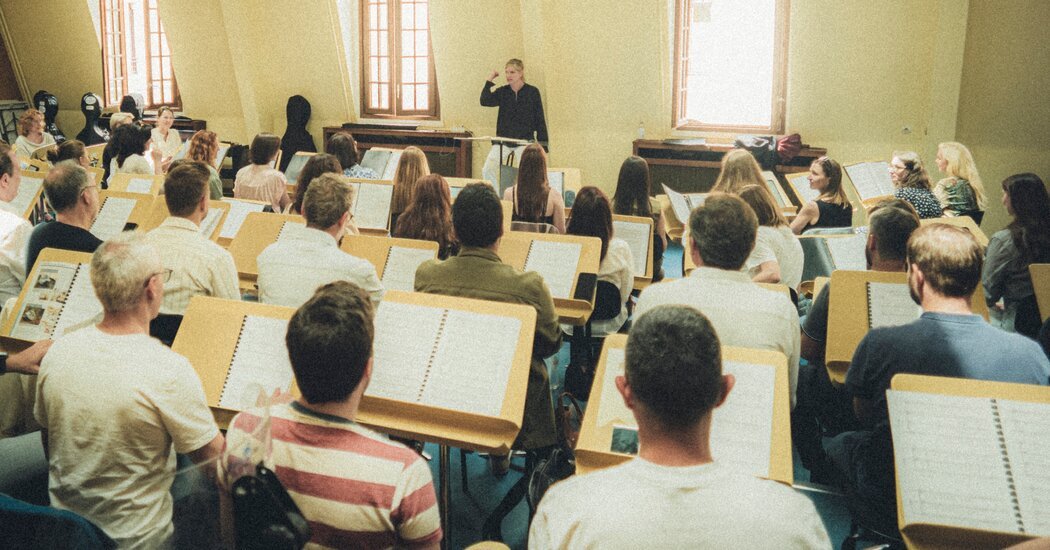When President Emmanuel Macron of France refused in February to rule out sending Western troops to Ukraine, he shattered a taboo and spooked his NATO allies. But five months later, his statement looks more like a provocation than a promise, and the idea of French boots on the ground seems a distant prospect.
There are other ways, however, that France’s military can aid the Ukrainian cause.
In a Paris church on Friday, 30 members of the Choir of the French Army will lend their voices to a free concert to honor Ukraine’s fighting spirit.
“We are here on a mission,” said the conductor Keri-Lynn Wilson during a recent rehearsal for the concert, “a mission to support Ukraine, on the artistic and cultural front.”
Then she led the singers of the all-male military choir, joined by 30 female members of a Ukrainian vocal ensemble, through a rendition of the last movement of Beethoven’s Ninth Symphony, the famous “Ode to Joy.” The massed voices soared in the echoing space.
At Friday’s concert, Wilson, a Canadian with Ukrainian roots, will conduct the singers alongside the 74-musician Ukrainian Freedom Orchestra in Saint-Eustache church. Since Russia’s full-scale invasion of Ukraine in 2022, the orchestra — some of whose members still live in the country at war — have been coming together each summer to perform across Europe, with Wilson conducting.
The concert in Paris is the first stop on the orchestra’s third tour. The ensemble will perform with local choirs when it plays concerts in London, Poland and the United States, where it will perform in Washington and, on Aug. 1, at the Cathedral of St. John the Divine in New York.
“We’ve been trying, since the beginning, to play in Paris,” said Peter Gelb, the director of the Metropolitan Opera, who founded the orchestra with Wilson, his wife. But Paris in the summer empties out, and its cultural life recedes, so it never seemed possible, Gelb explained. This summer was different: With the Olympics set to open on July 26, the city is bustling with events and was ideal place the orchestra to perform, he said.
Once the date and location were confirmed, the orchestra still faced organizational challenges. With Beethoven’s Ninth Symphony on the program, it needed to find a choir for the piece’s rousing final movement.
It took a call from the Ukrainian Embassy to the French foreign affairs ministry to get things moving. Aurélien Lechevallier, a ministry official, said that the Choir of the French Army, which performs at state functions like France’s Bastille Day celebrations, seemed an obvious fit.
“It’s beautiful to see the Army Choir making the link with the cultural and soft power aspects of France’s support for the Ukrainian people,” he said. A mixed Ukrainian-French ensemble performing the “Ode to Joy” — the anthem of the European Union — during the 200th anniversary year of Beethoven’s symphony, added extra symbolism, he added.
“Europe stands alongside Ukraine,” Lechevallier said, “and Ukraine also aspires to join Europe.”
For the performance, the German words of the Friedrich Schiller poem that Beethoven used for the final movement have been translated into Ukrainian, with references to joy, replaced with “slava” — glory in Ukrainian and a rallying cry for Ukrainian people in the war against Russia.
“It is Beethoven’s message that the force of good supersedes that of evil,” Wilson explained to the singers during the rehearsal.
Though most of the singers were familiar with the German version, learning the lyrics in Ukrainian was no simple task — especially for the tenors and basses of the Choir of the French Army. Hanna Hrymud, the chorus master for the Ukrainian singers, coordinated with her French counterpart to help. She wrote out the words phonetically for the French singers, and sent them an audio recording to help them practice.
Nicolas Bercet, a singer in the Choir of the French Army, said he was happy to sing alongside women, for once. “We don’t know each other, but the fact that we’re breathing together, that we’re driven by the same energy, immediately gives us a very full, generous sound,” he said. Singing in Ukrainian had also made him discover new aspects of the piece, he explained.
“The language is both fuller and darker than German, adding a velvety touch,” he said.
Wilson seemed impressed with the result. With just a month’s notice and little time to rehearse, the French singers had been quick to adapt — though as they sang during the rehearsal, she had to remind them to look at her, and not at their scores.
“We have a motto here at the army choir: Commemorate, honor and entertain — and this is a synthesis of all three,” Bercet said. “It’s a way of supporting Ukraine artistically.”
Read More: France’s Army Is Singing for Ukraine


